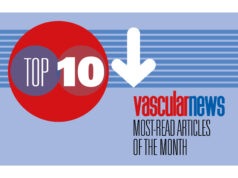
In a recently conducted survey, over 200 US advanced practice providers (APPs) in vascular surgery cited performing at the top of their licence as the most important determinant of job satisfaction. This and other key findings are set to be presented at the Midwestern Vascular Surgical Society (MVSS) annual meeting (12–14 September, Chicago, USA).
The research—conducted by author Saideep Bose (Saint Louis, USA) and colleagues—investigated scope of practice, workplace satisfaction and burnout among vascular-specific APPs who practice in the USA.
Bose, a vascular surgeon and assistant professor at Saint Louis University, told Vascular News ahead of his MVSS presentation that there is a “strong contingent” of APPs in vascular practice. “The main issue is that we don’t know how people in these APP positions feel about their careers or their jobs and if they feel like they are being utilised effectively or just being asked to do tasks that no one else wants to do,” he said, highlighting the genesis for the research.
In order to illuminate the experience of vascular-specific APPs, the researchers conducted a survey of 50 questions. The main component was the Mini Z survey—a validated questionnaire that was created by the Institute of Professional Worklife to look specifically at clinical burnout.
Bose shared that, of the 280 survey respondents, 47% were nurse practitioners, 31% were physician assistants and 21% were registered nurses.
One of the key questions on the survey probed the predictors of a joyful workplace. “Interestingly, there were only two things that were strongly predictive of a joyful workplace,” Bose revealed, “the ability for an APP to practise at the top of their licence and a shorter shift length”.
Another question considered factors that predict being comfortable in taking care of vascular patients. “Again, the number one thing was practising at the top of the licence,” Bose reported, also citing number of years practising as an APP taking care of vascular patients and being a member of the Society for Vascular Surgery (SVS) Physician Assistant Section or the Society for Vascular Nursing (SVN).
Bose et al subsequently investigated the defining factors of practising at the top of one’s licence, which they identified as seeing new patients in the outpatient clinic, a salaried pay structure and working with specific physicians. On the latter, Bose shared: “In my personal experience, I have seen that, because oftentimes a physician will have a particular specialty—for example aortic work or peripheral work—a physician nurse practitioner or a physician assistant who works specifically with them will become a master of that specialty as well. I think everyone benefits when there’s that pairing with specific physicians.”
Bose commented that the significance of these findings comes from the fact that “some of these are factors that we can change”. He elaborated: “We can make sure our APPs are paired with a particular physician, we can make sure they see new patients and we can make sure that they are salaried.”
On some of the key strengths of the survey, Bose highlighted that this is “one of the largest surveys that asks APPs about their experiences, their feelings and their work patterns”. What’s more, he noted that no studies to date have looked at vascular-specific APPs.
He did, however, recognise the limitations associated with this being a survey, including recall bias. “People that have very strong opinions one way or the other are more likely to respond to a survey,” he remarked.
Overall, he described the survey as a “good overview” of APPs’ experience, stressing that the next step should be to study this more systematically—to “really go into the programs where APPs are happy and ones where they are unhappy and try to tease out factors that explain that”.
“Our ultimate goal is not just to explain what’s going on, but to try to figure out management factors, practice factors that we can implement to increase the job satisfaction of these APPs.”













